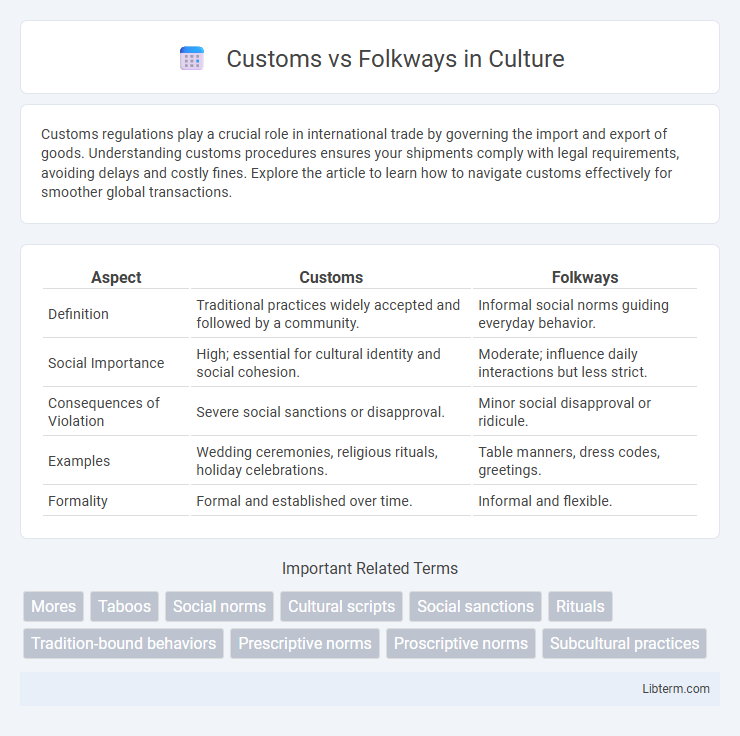Customs regulations play a crucial role in international trade by governing the import and export of goods. Understanding customs procedures ensures your shipments comply with legal requirements, avoiding delays and costly fines. Explore the article to learn how to navigate customs effectively for smoother global transactions.
Table of Comparison
| Aspect | Customs | Folkways |
|---|---|---|
| Definition | Traditional practices widely accepted and followed by a community. | Informal social norms guiding everyday behavior. |
| Social Importance | High; essential for cultural identity and social cohesion. | Moderate; influence daily interactions but less strict. |
| Consequences of Violation | Severe social sanctions or disapproval. | Minor social disapproval or ridicule. |
| Examples | Wedding ceremonies, religious rituals, holiday celebrations. | Table manners, dress codes, greetings. |
| Formality | Formal and established over time. | Informal and flexible. |
Defining Customs and Folkways
Customs are established practices or traditions widely accepted and followed by a particular society, reflecting its cultural norms and values. Folkways refer to informal social rules and everyday behaviors that guide routine interactions but lack strict enforcement or moral significance. Both customs and folkways are key components of cultural heritage, shaping social conduct and community identity.
Historical Origins of Customs and Folkways
Customs originated from traditional practices deeply rooted in historical societies, often codifying collective beliefs and social norms essential for group cohesion and survival. Folkways developed as informal, everyday social behaviors passed down orally, reflecting the cultural nuances and habitual interactions within communities over generations. The historical evolution of both customs and folkways reveals their role in shaping societal structure by preserving continuity and guiding behavior without formal legislation.
Key Differences Between Customs and Folkways
Customs are established social behaviors deeply rooted in tradition and often carry moral significance, while folkways are informal norms governing everyday behavior without strict enforcement. Customs typically involve collective rituals or practices important to a community's identity, whereas folkways guide routine interactions and vary widely across cultures. Violating customs often results in social sanctions or disapproval, while breaching folkways usually leads to mild social correction or awkwardness.
Social Functions of Customs and Folkways
Customs serve as established practices that promote social cohesion and continuity by reinforcing shared values and collective identity within a community. Folkways, as informal norms governing everyday behavior, facilitate social interaction and cooperation by providing predictable routines and reducing social friction. Both customs and folkways play essential roles in maintaining social order and cultural stability by guiding individual behavior in socially acceptable directions.
Cultural Significance and Impact
Customs are established patterns of behavior integral to societal rituals, shaping national identity and reinforcing social cohesion through formalized practices. Folkways represent informal norms governing everyday interactions, influencing cultural continuity by guiding routine conduct and social expectations. Both customs and folkways play crucial roles in preserving cultural heritage, impacting social stability and group unity at varying levels of formality.
Examples of Customs Across Societies
Customs such as greeting rituals vary widely: in Japan, bowing is a sign of respect, while in the United States, handshakes are common. In India, customs around food often include eating with the right hand, which symbolizes cleanliness and tradition. Moroccan tea ceremonies reflect hospitality and social bonding, illustrating how customs embed cultural values across societies.
Everyday Folkways in Different Cultures
Everyday folkways shape routine behaviors like greetings, dining etiquette, and dress codes, varying significantly across cultures. For example, in Japan, bowing is a common gesture of respect, while in many Western cultures, a handshake is customary. These informal social norms guide daily interactions and maintain social harmony without legal enforcement.
How Customs and Folkways Shape Identity
Customs and folkways shape identity by establishing shared behaviors and expectations within a community, reinforcing cultural norms and values. Customs, often deeply rooted rituals and traditions, provide a sense of belonging and continuity, while folkways guide everyday social interactions, subtly influencing individual conduct and group cohesion. Together, these social constructs define cultural identity by embedding collective experiences and practices into personal and communal self-understanding.
Changes and Adaptations Over Time
Customs evolve gradually as societies encounter new technologies, trade, and cultural exchanges, adapting rituals to fit contemporary contexts while preserving key traditional elements. Folkways shift more rapidly, reflecting changes in everyday social behavior such as dress codes, language, and manners influenced by urbanization and globalization. These adaptations highlight how both customs and folkways balance continuity with innovation to maintain social cohesion amid dynamic environments.
Influence on Social Behavior and Norms
Customs establish formalized rules that guide social behavior, reinforcing societal values and expectations through consistent practices. Folkways shape everyday actions by influencing informal norms, promoting social harmony and routine interactions without strict enforcement. Together, customs and folkways regulate social conduct, maintaining order and cultural continuity within communities.
Customs Infographic

 libterm.com
libterm.com